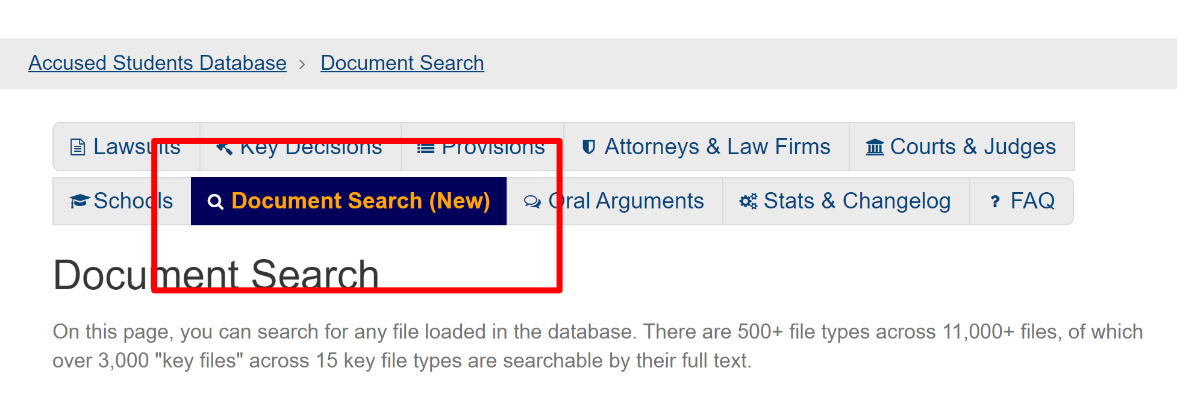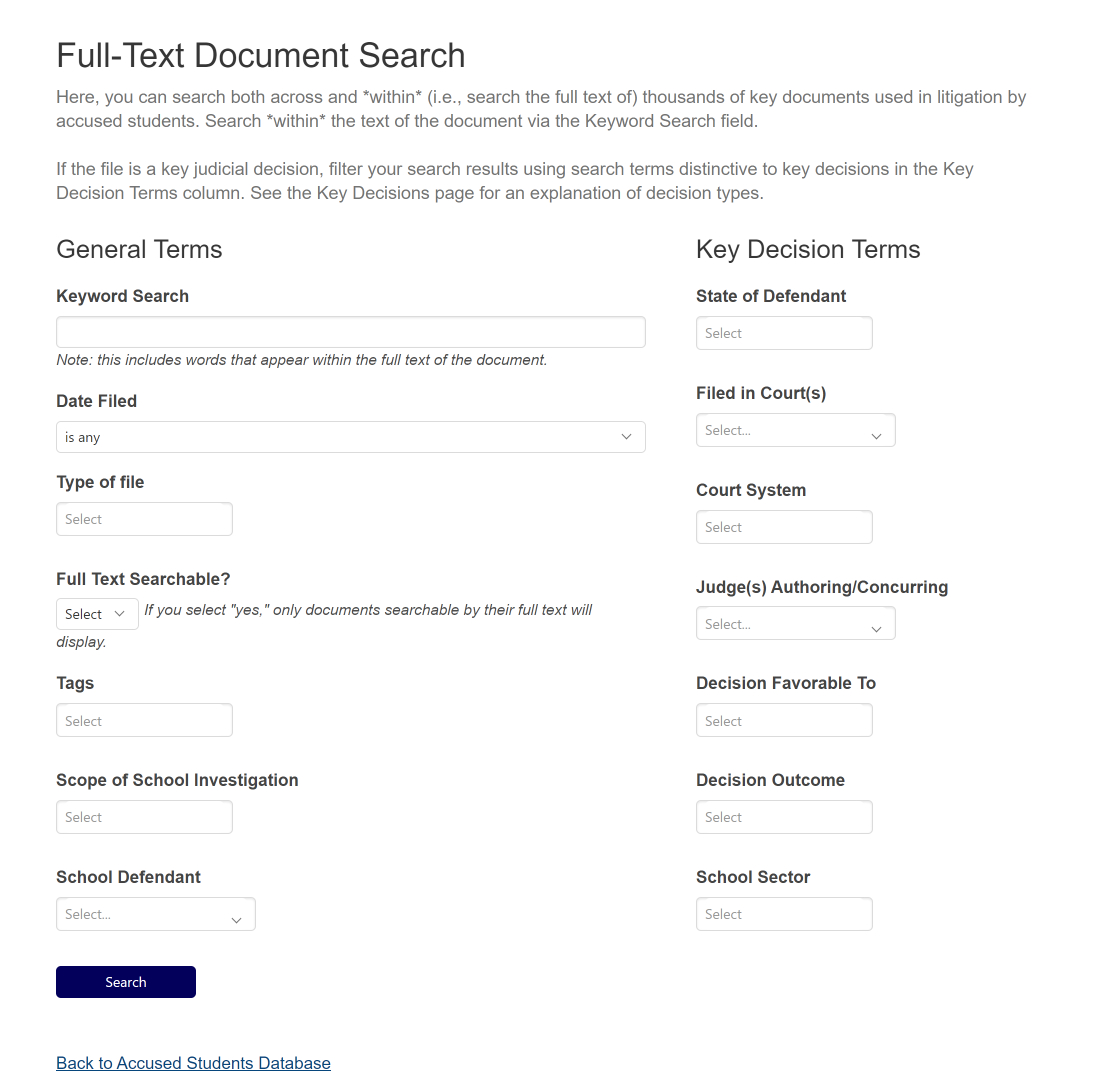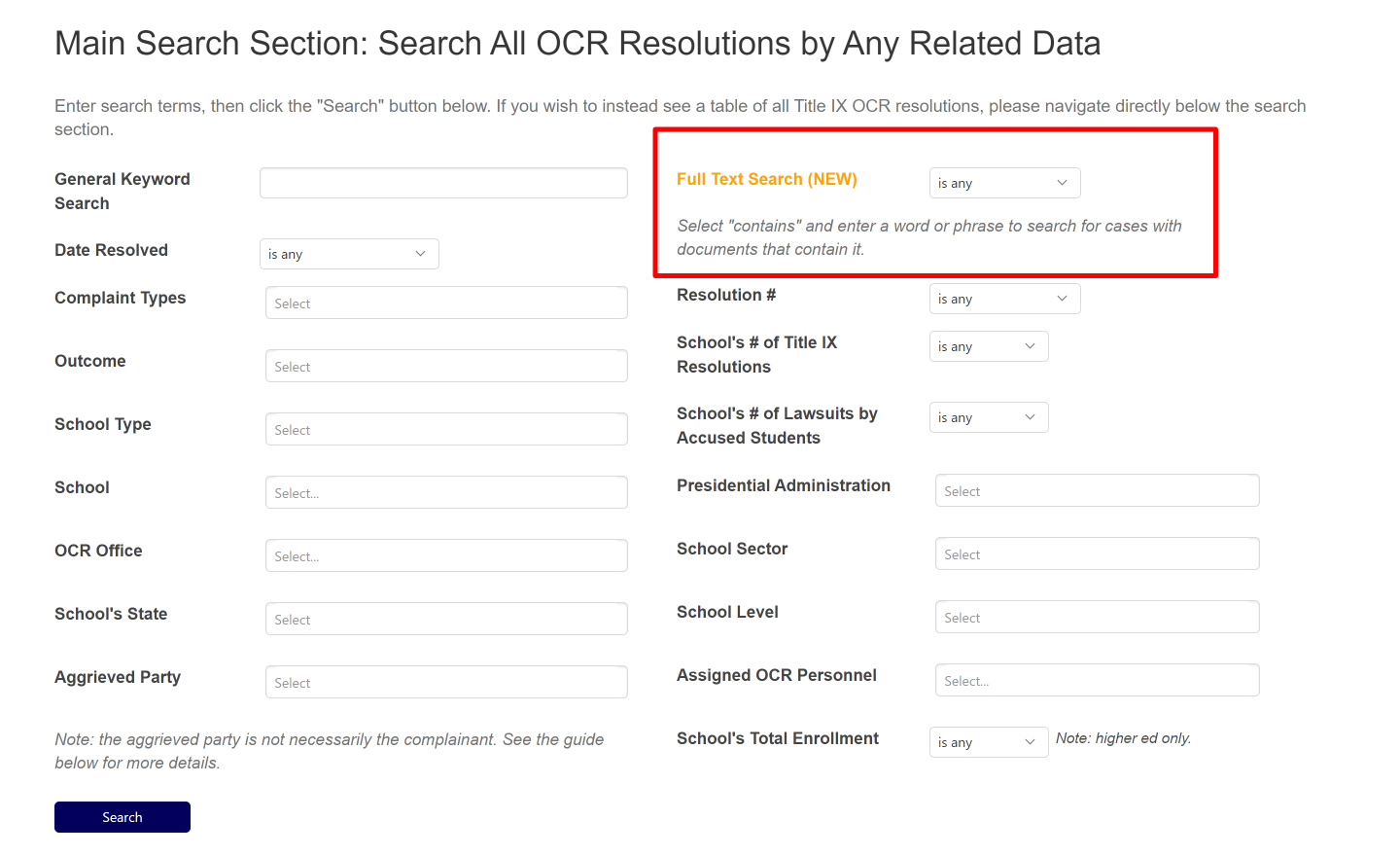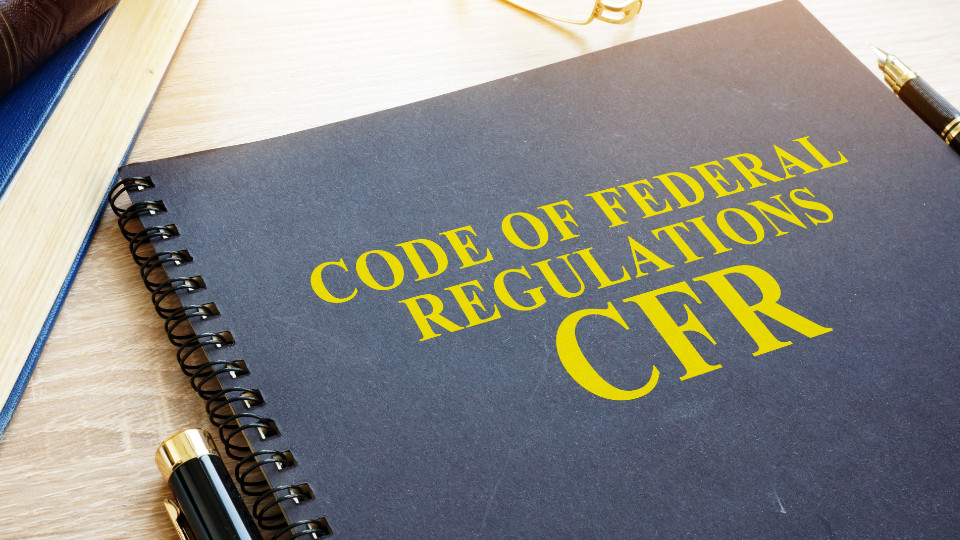We have just completed a new database feature allowing users to search all the documents in our Accused Students and OCR Resolutions databases by their specific document types. This means it is now possible to execute a search specifically for all complaints, or all orders regarding pseudonymity, or all exhibits, and so forth, that are found in the database.
Additionally, users can now search across 3,000+ “key lawsuit files” and ~2,000 OCR letters and resolutions by the full text of those documents. For example, if you want to search across thousands of lawsuit and OCR investigation files for documents that contain specific names, words, or phrases, that is now possible. Simply type in your search term and the database will pull up all lawsuit and OCR investigation files containing that term.
We believe this feature can be useful for a variety of reasons, including:
1. Researching Title IX personnel for general strategy or to make objections and appeals on the grounds of bias
Such personnel include decision-makers, Title IX coordinators, and investigators. A paper trail can assist with objecting to the bias of decision-makers or – after receiving the notice of determination and a finding of “responsible” – drafting an appeal based upon the bias of school personnel.
We had this situation come up a month ago when we talked to a student about his case. He believed the investigator was biased because she had selectively omitted relevant evidence in his favor. She then refused to respond to concerns about those omissions and did not make changes to the final version of the investigation report. We searched the full text of 11,000+ documents in our Accused Students Database and quickly found a complaint involving the same investigator and making the same claims when she was employed by another school.
Appeals are generally allowed on the grounds of procedural irregularities, new evidence, or bias, so at minimum, this information will assist the student with making an appeal. Researching personnel and how they tend to operate can also assist with anticipating any biased or unfair actions before they happen. Forewarned is forearmed.
2. Searching legal filings for citations to specific lawsuits
The tool is rather simple when used for this purpose but is nonetheless serviceable. For example, if you search Khan then you will get opinions and memoranda citing both Khan v. Yale (a remarkable case) and Khan v. Normand, the latter of which was cited in Doe v. University of Mississippi et al and arguing § 1983 and tort claims.
3. Searching OCR letters and resolution agreements for specific terms
A full-text search will help further refine searches for investigations involving specific matters such as “stalking,” “due process,” “scholarships,” and so forth.
Document Searching in the Accused Students Database
Once logged in, you can access the Document Search page from the main database menu:
Please note that for reasons of time and cost management (which in turn keeps subscription costs manageable) we do not make attempts to include every file of every case, but we do prioritize including as many “key files” as possible and making them full-text searchable. These “key files” are searchable by their full text. This database contains 15 key file types across 3,000+ “key files.” They are:
- Briefs
- Complaints
- Conclusions of law
- Decisions (Court of Appeal)
- Exhibits
- Memoranda
- Orders – injunctive relief
- Orders – judgment as matter of law
- Orders – judgment on the pleadings
- Orders – writ/similar (e.g., orders on writs of mandamus, writs of prohibition, Article 78 petitions, etc.)
- Orders – motion for summary judgment
- Orders – motion to dismiss
- Petitions – writ/similar (e.g., petitions for writs of mandamus or for prohibition, Article 78 petitions, etc.)
- Petitions – writ of certiorari (SCOTUS)
- Recommendations
Below is what the Document Search engine looks like. As you can see, you can refine your search further by specifying the date the document was filed, the specific allegations against the student, and other relevant terms:
Document Searching in the OCR Resolutions Database
The OCR Resolutions Database now allows full text searching across all its ~2,000 documents. The full-text search function is located in the main resolutions search engine which is front and center when you log in to the database. Placing it here seemed more appropriate; while the Accused Students Database has around five hundred individual file types (too many to list here!), the OCR Resolutions Database has only four: agreements, letters, referrals, and “additional resources.”
Here is a screenshot:
Conclusion
Thank you for reading about our latest database upgrade. This is the third database project we have completed this year. In January, we released the regulatory provision lookup and citation tool. In March, we converted the Title IX Lawsuits Database to the Accused Students Database – not really an upgrade per se, but a project for us nonetheless. And now, we have released the full-text document search tool.
We have more projects planned, of course. You can read about them in our Vision and Roadmap post from January. We will probably release at least one more database upgrade this year.
The project released today represents a shift in our focus from last year. In 2023, we focused on improving baseline user experience across the board for all our databases (see our end-of-year review). Because we made tremendous progress on these fronts, our goal for this year was to turn attention to improving individual databases. Still, whenever possible, we like to improve multiple databases simultaneously. Thankfully, that was possible here!
Thank You for Reading
If you like what you have read, feel free to sign up for our newsletter here:
About the Author
Related Posts
We have just completed a new database feature allowing users to search all the documents in our Accused Students and OCR Resolutions databases by their specific document types. This means it is now possible to execute a search specifically for all complaints, or all orders regarding pseudonymity, or all exhibits, and so forth, that are found in the database.
Additionally, users can now search across 3,000+ “key lawsuit files” and ~2,000 OCR letters and resolutions by the full text of those documents. For example, if you want to search across thousands of lawsuit and OCR investigation files for documents that contain specific names, words, or phrases, that is now possible. Simply type in your search term and the database will pull up all lawsuit and OCR investigation files containing that term.
We believe this feature can be useful for a variety of reasons, including:
1. Researching Title IX personnel for general strategy or to make objections and appeals on the grounds of bias
Such personnel include decision-makers, Title IX coordinators, and investigators. A paper trail can assist with objecting to the bias of decision-makers or – after receiving the notice of determination and a finding of “responsible” – drafting an appeal based upon the bias of school personnel.
We had this situation come up a month ago when we talked to a student about his case. He believed the investigator was biased because she had selectively omitted relevant evidence in his favor. She then refused to respond to concerns about those omissions and did not make changes to the final version of the investigation report. We searched the full text of 11,000+ documents in our Accused Students Database and quickly found a complaint involving the same investigator and making the same claims when she was employed by another school.
Appeals are generally allowed on the grounds of procedural irregularities, new evidence, or bias, so at minimum, this information will assist the student with making an appeal. Researching personnel and how they tend to operate can also assist with anticipating any biased or unfair actions before they happen. Forewarned is forearmed.
2. Searching legal filings for citations to specific lawsuits
The tool is rather simple when used for this purpose but is nonetheless serviceable. For example, if you search Khan then you will get opinions and memoranda citing both Khan v. Yale (a remarkable case) and Khan v. Normand, the latter of which was cited in Doe v. University of Mississippi et al and arguing § 1983 and tort claims.
3. Searching OCR letters and resolution agreements for specific terms
A full-text search will help further refine searches for investigations involving specific matters such as “stalking,” “due process,” “scholarships,” and so forth.
Document Searching in the Accused Students Database
Once logged in, you can access the Document Search page from the main database menu:
Please note that for reasons of time and cost management (which in turn keeps subscription costs manageable) we do not make attempts to include every file of every case, but we do prioritize including as many “key files” as possible and making them full-text searchable. These “key files” are searchable by their full text. This database contains 15 key file types across 3,000+ “key files.” They are:
- Briefs
- Complaints
- Conclusions of law
- Decisions (Court of Appeal)
- Exhibits
- Memoranda
- Orders – injunctive relief
- Orders – judgment as matter of law
- Orders – judgment on the pleadings
- Orders – writ/similar (e.g., orders on writs of mandamus, writs of prohibition, Article 78 petitions, etc.)
- Orders – motion for summary judgment
- Orders – motion to dismiss
- Petitions – writ/similar (e.g., petitions for writs of mandamus or for prohibition, Article 78 petitions, etc.)
- Petitions – writ of certiorari (SCOTUS)
- Recommendations
Below is what the Document Search engine looks like. As you can see, you can refine your search further by specifying the date the document was filed, the specific allegations against the student, and other relevant terms:
Document Searching in the OCR Resolutions Database
The OCR Resolutions Database now allows full text searching across all its ~2,000 documents. The full-text search function is located in the main resolutions search engine which is front and center when you log in to the database. Placing it here seemed more appropriate; while the Accused Students Database has around five hundred individual file types (too many to list here!), the OCR Resolutions Database has only four: agreements, letters, referrals, and “additional resources.”
Here is a screenshot:
Conclusion
Thank you for reading about our latest database upgrade. This is the third database project we have completed this year. In January, we released the regulatory provision lookup and citation tool. In March, we converted the Title IX Lawsuits Database to the Accused Students Database – not really an upgrade per se, but a project for us nonetheless. And now, we have released the full-text document search tool.
We have more projects planned, of course. You can read about them in our Vision and Roadmap post from January. We will probably release at least one more database upgrade this year.
The project released today represents a shift in our focus from last year. In 2023, we focused on improving baseline user experience across the board for all our databases (see our end-of-year review). Because we made tremendous progress on these fronts, our goal for this year was to turn attention to improving individual databases. Still, whenever possible, we like to improve multiple databases simultaneously. Thankfully, that was possible here!
Thank You for Reading
If you like what you have read, feel free to sign up for our newsletter here:
About the Author
Related Posts
More from Title IX for All
Accused Students Database
Research due process and similar lawsuits by students accused of Title IX violations (sexual assault, harassment, dating violence, stalking, etc.) in higher education.
OCR Resolutions Database
Research resolved Title IX investigations of K-12 and postsecondary institutions by the Department of Education’s Office for Civil Rights (OCR).
Attorneys Directory
A basic directory for looking up Title IX attorneys, most of whom have represented parties in litigation by accused students.









